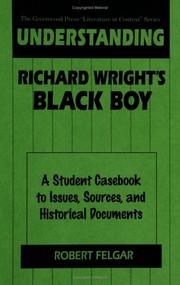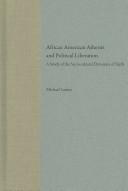Book
ISBN: 1421405415 9781421405414 9781421405193 1421405199 Year: 2012 Publisher: Baltimore Johns Hopkins University Press
Abstract | Keywords | Export | Availability | Bookmark
 Loading...
Loading...Choose an application
- Reference Manager
- EndNote
- RefWorks (Direct export to RefWorks)
An illuminating picture of mid-twentieth-century American literary culture and learned life, Psychology Comes to Harlem reveals the critical and intellectual innovation of literary artists who bridged psychology and antiracism to challenge segregation.
African Americans --- American literature --- Intellectual life --- African American authors --- History and criticism. --- Baldwin, James, --- Wright, Richard, --- Criticism and interpretation. --- Harlem (New York, N.Y.) --- Baldwin, James --- Baldwin, James Arthur --- Baldwin, Jimmy --- Bolduïn, Dz︠h︡eĭms --- Bōrudouin, J. --- Bōrudouin, Jēmuzu --- Болдуин, Джеймс --- ボールドウィン, J., --- ボールドウィン, ジェームズ, --- Raĭt, Richard, --- Raiṭ, Rits'ard, --- רייט, ריצ׳רד --- רייט, ריצ׳רד, --- رتشارد رايت --- رايت، رتشارد --- Rāyt, Rīchārd, --- راىت، رىچارد
Book
ISBN: 0813175194 0813175178 9780813175171 9780813175195 9780813175164 081317516X 0813175186 Year: 2018 Publisher: Lexington, Kentucky
Abstract | Keywords | Export | Availability | Bookmark
 Loading...
Loading...Choose an application
- Reference Manager
- EndNote
- RefWorks (Direct export to RefWorks)
A pillar of African American literature, Richard Wright is one of the most celebrated and controversial authors in American history. His work championed intellectual freedom amid social and political chaos. Despite the popular and critical success of books such asUncle Tom's Children(1938),Black Boy(1945), andNative Son(1941), Wright faced staunch criticism and even censorship throughout his career for the graphic sexuality, intense violence, and communist themes in his work. Yet, many political theorists have ignored his radical ideas.InThe Politics of Richard Wright, an interdisciplinary group of scholars embraces the controversies surrounding Wright as a public intellectual and author. Several contributors explore how the writer mixed fact and fiction to capture the empirical and emotional reality of living as a black person in a racist world. Others examine the role of gender in Wright's canonical and lesser-known writing and the implications of black male vulnerability. They also discuss the topics of black subjectivity, internationalism and diaspora, and the legacy of and responses to slavery in America.Wright's contributions to American political thought remain vital and relevant today.The Politics of Richard Wrightis an indispensable resource for students of American literature, culture, and politics who strive to interpret this influential writer's life and legacy.
Race in literature. --- Politics in literature. --- African Americans in literature. --- Blacks in literature. --- Politics and literature --- Negroes in literature --- Afro-Americans in literature --- Political science in literature --- History --- Wright, Richard, --- Raĭt, Richard, --- Raiṭ, Rits'ard, --- רייט, ריצ׳רד --- רייט, ריצ׳רד, --- رتشارد رايت --- رايت، رتشارد --- Rāyt, Rīchārd, --- راىت، رىچارد --- Criticism and interpretation. --- Political and social views. --- Blacks in literature --- Black people in literature.

ISBN: 0313008035 9780313008030 9780313302213 0313302219 9798216029755 Year: 1998 Publisher: Westport, Conn. Greenwood Press
Abstract | Keywords | Export | Availability | Bookmark
 Loading...
Loading...Choose an application
- Reference Manager
- EndNote
- RefWorks (Direct export to RefWorks)
Authors, American --- African American authors --- African American youth --- African Americans --- Afro-Americans --- Black Americans --- Colored people (United States) --- Negroes --- Africans --- Ethnology --- Blacks --- Afro-American youth --- Negro youth --- Youth, African American --- Youth --- Afro-American authors --- Authors, African American --- Negro authors --- American authors --- Biography --- History and criticism --- Wright, Richard, --- Raĭt, Richard, --- Raiṭ, Rits'ard, --- רייט, ריצ׳רד --- רייט, ריצ׳רד, --- رتشارد رايت --- رايت، رتشارد --- Rāyt, Rīchārd, --- راىت، رىچارد --- Childhood and youth --- Black people --- African American men --- Sources. --- Intellectual life.
Book
ISBN: 1108773524 1108803296 1108803563 1108488951 Year: 2021 Publisher: Cambridge : Cambridge University Press,
Abstract | Keywords | Export | Availability | Bookmark
 Loading...
Loading...Choose an application
- Reference Manager
- EndNote
- RefWorks (Direct export to RefWorks)
Richard Wright was one of the most influential and complex African American writers of the twentieth century. Best known as the trailblazing, bestselling author of Native Son and Black Boy, he established himself as an experimental literary intellectual in France who creatively drew on some of the leading ideas of his time - Marxism, existentialism, psychoanalysis, and postcolonialism - to explore the sources and meaning of racism both in the United States and worldwide. Richard Wright in Context gathers thirty-three new essays by leading scholars relating Wright's writings to biographical, regional, social, literary, and intellectual contexts essential to understanding them. It explores the places that shaped his life and enabled his literary destiny, the social and cultural contexts he both observed and immersed himself in, and the literary and intellectual contexts that made him one the most famous Black writers in the world at mid-century.
American literature --- African Americans --- Authors, American --- African American authors --- African Americans in literature. --- Afro-Americans in literature --- Negroes in literature --- Afro-Americans --- Black Americans --- Colored people (United States) --- Negroes --- Africans --- Ethnology --- Blacks --- History and criticism. --- Social conditions --- Wright, Richard, --- Raĭt, Richard, --- Raiṭ, Rits'ard, --- רייט, ריצ׳רד --- רייט, ריצ׳רד, --- رتشارد رايت --- رايت، رتشارد --- Rāyt, Rīchārd, --- راىت، رىچارد --- Political and social views. --- Criticism and interpretation. --- Black people
Book
ISBN: 0807101737 9780807101735 0807103934 9780807103937 Year: 1976 Publisher: Baton Rouge Louisiana State University Press
Abstract | Keywords | Export | Availability | Bookmark
 Loading...
Loading...Choose an application
- Reference Manager
- EndNote
- RefWorks (Direct export to RefWorks)
Dillard, J.L., 19-?- . Black English --- American literature --- Littérature américaine --- African American authors --- History and criticism --- Auteurs noirs américains --- Histoire et critique --- African Americans --- African Americans in literature. --- History and criticism. --- Intellectual life. --- Littérature américaine --- Auteurs noirs américains --- Wright, Richard --- Toomer, Jean --- African Americans in literature --- Afro-Americans in literature --- Negroes in literature --- African American intellectuals --- African American authors&delete& --- Intellectual life --- Wright, Richard, --- Toomer, Jean, --- Toomer, N. Jean, --- Pinchback, Eugene, --- Pinchback, Nathan Eugene, --- Raĭt, Richard, --- Raiṭ, Rits'ard, --- רייט, ריצ׳רד --- רייט, ריצ׳רד, --- رتشارد رايت --- رايت، رتشارد --- Rāyt, Rīchārd, --- راىت، رىچارد --- Criticism and interpretation. --- English literature --- Agrarians (Group of writers)

ISBN: 0252002016 Year: 1972 Publisher: Urbana : University of Illinois Press,
Abstract | Keywords | Export | Availability | Bookmark
 Loading...
Loading...Choose an application
- Reference Manager
- EndNote
- RefWorks (Direct export to RefWorks)
Wright, Richard, 1908-1960. Lawd Today --- Wright, Richard, 1908-1960. Uncle Tom's Children --- Authors, American --- African American authors --- African Americans in literature. --- Wright, Richard, --- African Americans in literature --- -American authors --- Afro-Americans in literature --- Negroes in literature --- Afro-American authors --- Authors, African American --- Negro authors --- Wright, Richard --- -Wright, Richard --- -Afro-Americans in literature --- American authors --- Raĭt, Richard, --- Raiṭ, Rits'ard, --- רייט, ריצ׳רד --- רייט, ריצ׳רד, --- رتشارد رايت --- Criticism and interpretation --- رايت، رتشارد --- Rāyt, Rīchārd, --- راىت، رىچارد --- Wright, Richard (1908-1960) --- Critique et interprétation --- Critique et interprétation

ISBN: 0804692343 9780804692342 Year: 1979 Volume: *4 Publisher: Port Washington Kennikat press
Abstract | Keywords | Export | Availability | Bookmark
 Loading...
Loading...Choose an application
- Reference Manager
- EndNote
- RefWorks (Direct export to RefWorks)
Thematology --- Malamud, Bernard --- Wright, Richard --- African Americans in literature --- Afro-Americans in literature --- Afro-Amerikanen in de literatuur --- Afro-Américains dans la littérature --- Amerikaanse zwarten in de literatuur --- Black Americans in literature --- Jews in literature --- Joden in de literatuur --- Juifs dans la littérature --- Negroes in literature --- Noirs américains dans la littérature --- Zwarte Amerikanen in de literatuur --- American fiction --- -Jews in literature --- Victims in literature --- Revolutionaries in literature --- Dissenters in literature --- Revolutionists in literature --- American literature --- History and criticism --- -Wright, Richard --- -Criticism and interpretation --- Criticism and interpretation --- Wright, Richard, --- -Fidelman, Arthur --- Ma-la-mo --- Lumn, Peter --- Маламуд, Бернард --- מלמוד, ברנארד --- מלמוד, ברנרד --- Raĭt, Richard, --- Raiṭ, Rits'ard, --- רייט, ריצ׳רד --- רייט, ריצ׳רד, --- رتشارد رايت --- Fidelman, Arthur --- Criticism and interpretation. --- 20th century --- رايت، رتشارد --- Rāyt, Rīchārd, --- راىت، رىچارد --- American fiction - 20th century - History and criticism --- Wright, Richard, - 1908-1960 - Criticism and interpretation --- Malamud, Bernard - Criticism and interpretation --- Wright, Richard, - 1908-1960

ISBN: 0813039452 0813040086 9780813040080 9780813030357 0813030358 9780813033181 0813033187 9780813039459 Year: 2007 Publisher: Gainesville : University Press of Florida,
Abstract | Keywords | Export | Availability | Bookmark
 Loading...
Loading...Choose an application
- Reference Manager
- EndNote
- RefWorks (Direct export to RefWorks)
Describes a philosophical tradition of 'black liberation atheism' that emerges, gaining coherence and momentum, in the twentieth century
African American authors --- African Americans --- African Americans in literature. --- Atheism and literature --- American literature --- Afro-American authors --- Authors, African American --- Negro authors --- Authors, American --- Afro-Americans in literature --- Negroes in literature --- Literature and atheism --- Literature --- Political and social views. --- Religion. --- History --- History and criticism. --- Hughes, Langston, --- Larsen, Nella --- Wright, Richard, --- Hughes, James Langston, --- Khʹi︠u︡z, Lengston, --- Hiyūz, Lānkistūn, --- Khʹi︠u︡z, L. --- Huza, L., --- יוז, לענגסטאן, --- ヒューズラングストン, --- Walker, Nellie, --- Larsen, Nellye --- Larsen, Nellie --- Imes, Nella --- Raĭt, Richard, --- Raiṭ, Rits'ard, --- רייט, ריצ׳רד --- רייט, ריצ׳רד, --- رتشارد رايت --- رايت، رتشارد --- Rāyt, Rīchārd, --- راىت، رىچارد --- Criticism and interpretation. --- Hugues, Langston --- History and criticism --- United States --- 20th century --- African Americans in literature --- Religion --- Political and social views --- Wright, Richard --- Criticism and interpretation --- Hughes, Langston
Book
ISBN: 150170138X 1501701398 9781501701399 9780801453502 080145350X 1501755315 9781501701382 Year: 2015 Publisher: Ithaca, New York ; London, [England] : Cornell University Press,
Abstract | Keywords | Export | Availability | Bookmark
 Loading...
Loading...Choose an application
- Reference Manager
- EndNote
- RefWorks (Direct export to RefWorks)
In Under the Strain of Color, Gabriel N. Mendes recaptures the history of a largely forgotten New York City institution that embodied new ways of thinking about mental health, race, and the substance of citizenship. Harlem's Lafargue Mental Hygiene Clinic was founded in 1946 as both a practical response to the need for low-cost psychotherapy and counseling for black residents (many of whom were recent migrants to the city) and a model for nationwide efforts to address racial disparities in the provision of mental health care in the United States. The result of a collaboration among the psychiatrist and social critic Dr. Fredric Wertham, the writer Richard Wright, and the clergyman Rev. Shelton Hale Bishop, the clinic emerged in the context of a widespread American concern with the mental health of its citizens. It proved to be more radical than any other contemporary therapeutic institution, however, by incorporating the psychosocial significance of anti-black racism and class oppression into its approach to diagnosis and therapy. Mendes shows the Lafargue Clinic to have been simultaneously a scientific and political gambit, challenging both a racist mental health care system and supposedly color-blind psychiatrists who failed to consider the consequences of oppression in their assessment and treatment of African American patients. Employing the methods of oral history, archival research, textual analysis, and critical race philosophy, Under the Strain of Color contributes to a growing body of scholarship that highlights the interlocking relationships among biomedicine, institutional racism, structural violence, and community health activism.
Community psychiatry --- Social psychiatry --- African Americans --- Psychiatry, Community --- Community psychology --- Psychiatry --- Psychiatry, Social --- Clinical sociology --- Mental health --- Social medicine --- Social psychology --- Afro-Americans --- Black Americans --- Colored people (United States) --- Negroes --- Africans --- Ethnology --- Blacks --- Mental health services --- Wertham, Fredric, --- Wright, Richard, --- Lafargue Clinic (New York, N.Y.) --- Lafargue Mental Hygiene Clinic (New York, N.Y.) --- Harlem (New York, N.Y.) --- Harlem, New York (City) --- Wertheimer, Frederick Ignace, --- Wertheimer, F. I. --- Wertham, Frederic, --- Wertheimer, Friedrich Ignatz, --- Raĭt, Richard, --- Raiṭ, Rits'ard, --- רייט, ריצ׳רד --- רייט, ריצ׳רד, --- رتشارد رايت --- رايت، رتشارد --- Rāyt, Rīchārd, --- راىت، رىچارد --- Black people --- Brown v. Board of Education and social science, healthcare and civil rights, black mental health, Richard wrigth,.
Book
ISBN: 0313274711 9780313274718 Year: 1991 Publisher: New York Westport London : Greenwood Press,
Abstract | Keywords | Export | Availability | Bookmark
 Loading...
Loading...Choose an application
- Reference Manager
- EndNote
- RefWorks (Direct export to RefWorks)
African Americans in literature --- Afro-Americans in literature --- Afro-Amerikanen in de literatuur --- Afro-Américains dans la littérature --- Amerikaanse zwarten in de literatuur --- Black Americans in literature --- Negroes in literature --- Noirs américains dans la littérature --- Zwarte Amerikanen in de literatuur --- African American men --- American fiction --- Political fiction, American --- Politics and literature --- American literature --- Intellectual life --- African American authors&delete& --- History and criticism --- History --- Du Bois, W. E. B. --- Ellison, Ralph --- Johnson, James Weldon, --- Wright, Richard, --- Raĭt, Richard, --- Raiṭ, Rits'ard, --- רייט, ריצ׳רד --- רייט, ריצ׳רד, --- رتشارد رايت --- Johnson, J. W. --- Johnson, Jas. W. --- אליסון, ראלף --- Du Bois, W. E. Burghardt --- Du Bois, W. E. --- Di︠u︡bua, Uilʹi︠a︡m Ėdvard Burgkhardt, --- Di︠u︡bua, Vilʹi︠a︡m, --- Du Bois, William Edward Burghardt, --- DuBois, W. E. B. --- Du Bois, William, --- Du Bois, W. B. --- Political and social views. --- Political fiction [American ] --- African American authors --- Johnson, James Weldon --- Political and social views --- Du Bois, William Edward Burghardt --- Wright, Richard --- Ellison, Ralph Waldo --- رايت، رتشارد --- Rāyt, Rīchārd, --- راىت، رىچارد --- Johnson, James Weldon (1871-1938) --- Du Bois, William Edward Burghardt (1868-1963) --- Wright, Richard (1908-1960) --- Ellison, Ralph (1914-1994) --- Noirs --- Roman américain --- Politique-fiction américaine --- Littérature américaine --- Noirs américains --- Pensée politique et sociale --- États-Unis --- Dans la littérature --- Auteurs noirs américains --- Histoire et critique --- Dans la littérature américaine --- Thèmes, motifs

 Search
Search Feedback
Feedback About UniCat
About UniCat  Help
Help News
News